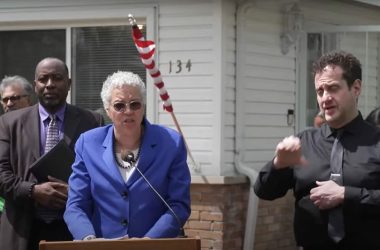Bill would ensure that downstate Illinois communities devastated by severe weather are not penalized based on total state population
WASHINGTON–(ENEWSPF)–January 27, 2014. U.S. Senators Mark Kirk (R-Ill.) and Dick Durbin (D-Ill.) today introduced their bipartisan legislation to bring consistency and fairness to the Federal Emergency Management Agency (FEMA)’s disaster declaration process. Kirk and Durbin first introduced their Fairness in Federal Disaster Declarations Act after FEMA denied federal assistance to communities – including Harrisburg and Ridgway – following devastating storms and tornadoes that swept through Southern Illinois in late February 2012.
FEMA is currently reviewing its process for Public Assistance as required by law in the Sandy Recovery Improvement Act of 2013. In a letter to FEMA earlier this month, Kirk and Durbin asked the agency to also fix their funding formulas for Individual Assistance which was denied to local governments in Champaign, Douglas, Grundy, Massac, Tazewell, Vermilion, Washington, Wayne and Woodford counties following deadly storms and tornadoes in November 2013.
“Over $6 million in damages were incurred following November’s deadly tornadoes, and hundreds of families are still struggling to rebuild and recover,” Senator Kirk said. “A disaster is a disaster, regardless of what state it happens in. This bipartisan legislation will ensure that families who have had their homes and communities destroyed are given the help that they need.”
“In many other states, the amount of damage sustained by Central Illinois communities last November would easily qualify for federal assistance,” said Senator Durbin. “I am encouraged that, since we first introduced our legislation in 2012, FEMA has begun reviewing a portion of the disaster declaration process. While our legislation would go further – forcing FEMA to bring fairness to the entire program – these changes may not come soon enough for communities in Central Illinois where more help is needed now. I will continue working Senator Kirk and our Illinois colleagues to support Governor Quinn’s appeal of FEMA’s initial denial of Public Assistance.”
The Fairness in Federal Disaster Declarations Act would ensure consistency by requiring FEMA to give a specified weight to each of the factors considered when determining which communities are eligible for two types of federal assistance – Individual and Public. It also would require FEMA to take into consideration local economic factors including: the local assessable tax base, the median income as it compares to that of the state, and the poverty rate as it compares to that of the state.
Last week, the legislation was introduced in the House of Representatives by a bipartisan group of members from the Illinois Congressional Delegation including: Representatives Cheri Bustos (D-Ill.), Rodney Davis (R-Ill.), John Shimkus (R-Ill.), Aaron Schock (R-Ill.), Adam Kinzinger (R-Ill.) and Bill Enyart (D-Ill.).
In a severe storm or natural disaster, communities in a state, like Illinois, with a large population – more than 10 million people – must incur a relatively higher level of damage than communities in a state with a smaller population. This is true in determining whether both Individual Assistance and Public Assistance is warranted. The Durbin-Kirk bill would require FEMA to take into consideration local economic factors in order to ensure that communities struck by disaster are not denied federal assistance because of the population of the state.
Though FEMA has never revealed an exact formula for determining a disaster declaration, FEMA has confirmed that the agency considers six factors to determine eligibility for both Individual Assistance and Public Assistance. The relative weight of each factor remains unknown and may even fluctuate with different scenarios. The Fairness in Federal Disaster Declarations Act would make clear and consistent the criteria for emergency designation and the weight each is given for both Public Assistance and Individual Assistance, as laid out below:
Public Assistance Program
1. Estimated cost of the assistance – 10%
2. Localized impacts – 40%
3. Insurance coverage in force – 10%
4. Hazard mitigation – 10%
5. Recent multiple disasters – 10%
6. Other Federal assistance – 10%
7. Economic considerations – 10%.
Individual Assistance Program
1. Concentration of damages – 20%
2. Trauma – 20%
3. Special populations – 20%
4. Voluntary agency assistance – 10%
5. Insurance – 20%
6. Average of individual assistance– 5%
7. Economic considerations – 5%.
FEMA makes recommendations for federal disaster declarations allowing individuals, businesses and local governments to apply for federal grants or loans. Individual Assistance funding provides assistance to individuals and businesses to help with temporary housing, home repairs or replacement and other disaster-related expenses. Public Assistance funding provides assistance to local and state governments for extraordinary costs for response and recovery to the disaster. This can include emergency work, debris removal from public roads and repair and replacement of disaster-damaged public facilities or infrastructure.
Following the November 2013 deadly storms, Governor Quinn requested federal aid for local governments in Champaign, Douglas, Grundy, Massac, Tazewell, Vermilion, Washington, Wayne and Woodford counties. On November 26, President Obama issued a major disaster declaration for the State of Illinois making residents and businesses eligible for federal Individual Assistance funding which provides financial assistance to help with temporary housing, home repairs or replacement and other disaster-related expenses. Though more than $12 million in federal aid has been approved to help people and businesses affected by the November tornadoes and severe storms, Governor Quinn’s request for Public Assistance to cover the repairs or replacement of infrastructure (roads, bridges, public buildings, etc.) and other local government costs was denied last week.
Source: kirk.senate.gov








